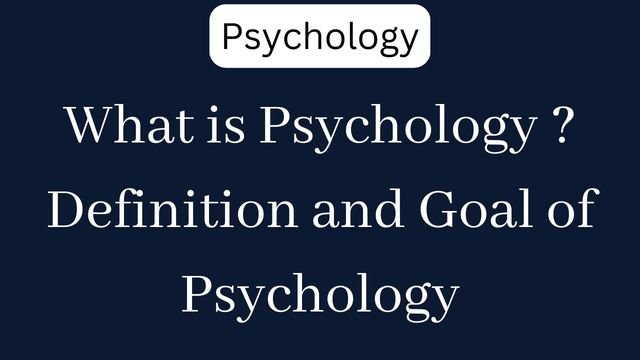What is Psychology ? Definition and Goal of Psychology
What is Psychology ?
- Psychology is the study of human behaviour. The main study area of psychology is how a person perceives, learn, think, remembers, understands and how an individual interacts with the objects and events in his environment. Apart from this psychologists strive to find answers to these questions such as, why a person easily learn something and unable to learn other things in spite of practise and effort? How thinking develops in an individual? Why individuals have different perceptions? How personality development takes place etc. Due to this eagerness and curiosity we are bound to think how all individuals are different from each other accordingly to their intelligence, attitude and behaviour. Sometimes they become sad and sometimes happy, and how they become friends to each other and how they become enemies? Some people learn to perform a task quickly, while others take much time? Even an inexperienced person can answer these questions, and also the one who has the knowledge of the psychology. An inexperienced person will answer these questions on the basis of common sense while a psychologist will answer in scientific manner after studying the series of psychological reasons behind these actions. In this chapter, we will try to understand in detail the nature and area of psychology.
Definition and Goal of Psychology
- Psychology is deri ved from two Greek words “Psyche and “Logos” meaning of Psyche is Soul and Logos means Science or study of a subject. Therefore, according to these literal meanings Psychology has been considered as the study of soul of the subject. Early Greek philosophers such as Aristotle and Plato considered psychology as the science of the soul. Early Greek philosophers such as Leibnitz, Locke etc. called psychology as the “Science of the Soul’ in this way these people considered psychology as the subject of “study of mind” but the spirit or mind both of which were of such nature something unobservable and indemonstrable. So, both of the definitions are not considered acceptable for scientific study. After this, people called psychology as the subject which studies about consciousness and conscious experience. Wilhelm Wundt and his disciples Titchner were major supporters of the definition but this definition was not considered acceptable for scientific study, as the definition is not providing any observational and scientific understanding of the subject. Wilhelm Wundt is considered as the father of Experimental psychology as he opened first psychological laboratory in the year 1879 in Leipzig University (Germany).
- Modern psychologist tried to explain psychology in more scientific and objective manner. These psychologists considered psychology as the science of behaviour.
- J.B.Watson was the first psychologist who defines psychology as the Science of Behaviour. Behaviour was defined as the concrete and observable aspect. So this is different from spirit mind and consciousness which were all subjective and whose observation could not be possible. The subject matter of psychology is behavioural process which can easily observed. Psychology studies learning, perception and gesture whose objective study is possible. With this, psychology is also study mental processes which are not directly observable but they can be easily estimated by behavioural and psychological statistics. With these facts in mind, definition of psychology was given by Santrock, 2000 “Psychology is the scientific study of behaviour and mental processes.”
- Baron, 2001 “Psychology is a science which defines cognitive processes and behaviour”.
- Ciccarelli and Meyer, 2006 “Psychology is the scientific study of behavioural and mental processes”
Important Points
- This chapter of Psychology Consider behaviour as Psychology and gives definition, nature and goals.
- The study of humen behaviour is goal directed Hence Psychology has prusceted discipline measurment, Prediction and control.
- History of Psychology is discribed evolution of Psychology as pre scientific and scientific period.
- Different schools of Psychology explained and stretnitham Functionalism, Gestaff, behaviour nd Psycloanysis.
- Emphasis has been given to evaluation of psychology in India and its relation with other disciplines were discussed as spinal cold because wherever humen being is there, development is also him thats wire is called
I. The origin of the term “Psychology” is from____words
a. Greek
b. Latin
c. Hindi
d. English
Click to show/hide
II. William Wundt established first psychology laboratory in____
a. Cornell University, 1992
b. Harward University, 1892
c. Leipzig University, 1879
d. No one from the above
Click to show/hide
III. Meaning of Psyche is_____
a. Deliberation
b. Study
c. Soul
d. Consciousness
Click to show/hide
IV. Which of these is not amongst the goals of Psychology?
a. Measurement and Description
b. Interpretation
c. Prediction and Control
d. Testing
Click to show/hide
V. “Humans are born with qualities of selfishness, aggressiveness, which are controlled by the society” whose statement is this.
a. Rousseau
b. Spencer
c. Sigmund Freud
d. J.B.Watson
Click to show/hide

What to learn more about psychology.